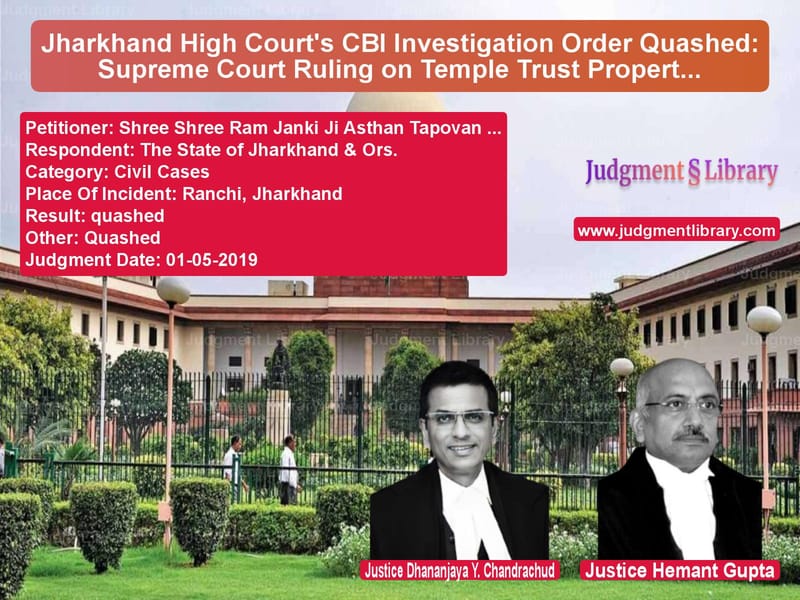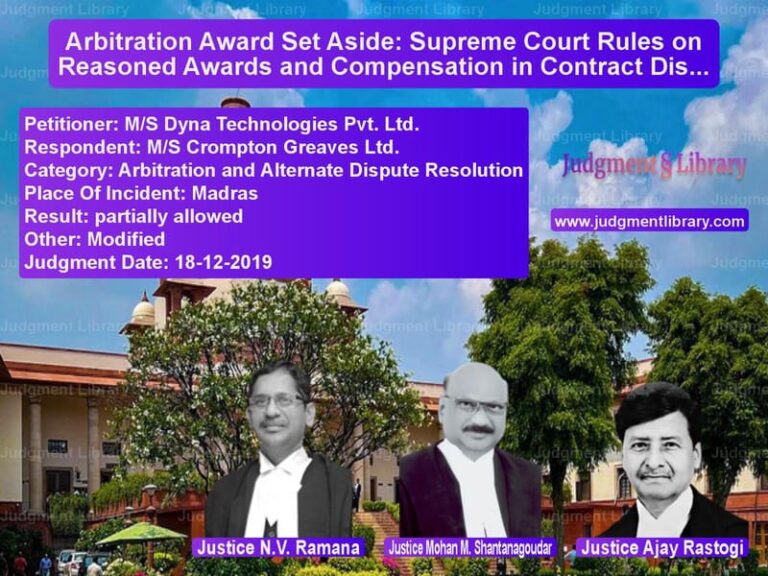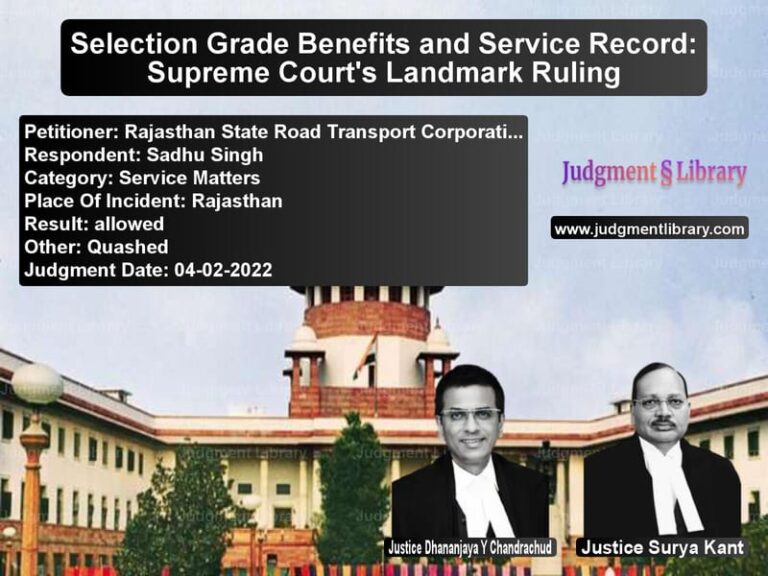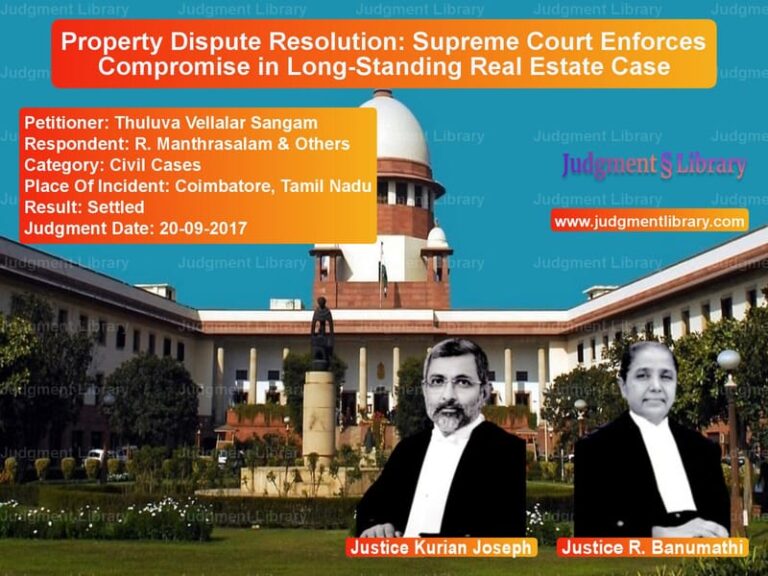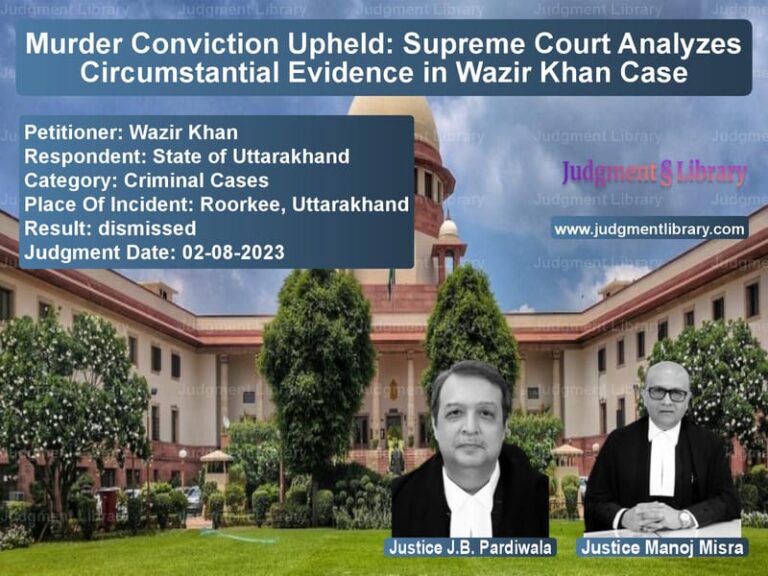Jharkhand High Court’s CBI Investigation Order Quashed: Supreme Court Ruling on Temple Trust Property
The case of Shree Shree Ram Janki Ji Asthan Tapovan Mandir & Anr. vs. The State of Jharkhand & Ors. concerned the alleged illegal transfer of land belonging to a temple trust and whether the Jharkhand High Court was justified in ordering a CBI investigation. The Supreme Court was called upon to determine whether such an order was necessary and if it was in line with legal precedents governing the role of the judiciary in directing criminal investigations.
Background of the Case
The dispute arose when a Public Interest Litigation (PIL) was filed in the Jharkhand High Court, alleging that the trustees of the Shree Shree Ram Janki Ji Asthan Tapovan Mandir had illegally transferred temple land in violation of the trust deed. The PIL claimed that new trust deeds had been created to facilitate fraudulent sales of temple property, thereby depriving the deity of its rightful assets.
The High Court found that the original trust deed of 1948 did not permit the sale or transfer of land and that subsequent reconstitutions of the trust in 1987 and 2005 introduced clauses allowing such transfers. Suspecting fraud and illegal encroachment, the High Court directed the CBI to investigate the matter.
Key Legal Issues
- Whether the High Court had sufficient grounds to direct a CBI investigation into the alleged illegal transfer of temple trust land.
- Whether the trust’s actions in selling or transferring land were legally permissible.
- Whether the PIL petitioner had the legal standing to challenge the trust’s actions in a public interest litigation.
Arguments Presented
Petitioners (Shree Shree Ram Janki Ji Asthan Tapovan Mandir & Others):
- The trust had followed due legal procedures, including obtaining approvals from the Bihar State Board of Religious Trust and the Jharkhand State Hindu Religious Trust Board, before selling any property.
- The trust had transferred land to prevent illegal encroachments and generate revenue for the temple’s maintenance.
- The PIL petitioner had not lodged a formal complaint with the police before approaching the High Court, and the matter was a civil dispute, not a criminal offense requiring a CBI investigation.
Respondents (State of Jharkhand & PIL Petitioner):
- The land transfers violated the original 1948 trust deed, which prohibited sales or transfers.
- The trust had fraudulently modified its governing documents in 2005 to enable sales.
- The involvement of state officials in granting approvals necessitated an independent investigation.
High Court’s Ruling
The Jharkhand High Court ruled that the matter required an independent investigation, citing the following reasons:
- The trust had changed its rules over time to facilitate land sales, raising suspicions of mismanagement.
- The state government and its functionaries were involved in granting approvals for the transactions, which warranted external scrutiny.
- Similar cases involving fraudulent land transfers in Ranchi had been previously handed over to the CBI.
The High Court directed the CBI to take over the investigation and submit a report within six months.
Supreme Court’s Observations and Judgment
The Supreme Court reviewed the case and found the High Court’s order directing a CBI investigation unjustified. It held that:
- “The High Court has traveled beyond its jurisdiction by directing an independent investigation without concrete evidence of criminality.”
- “The trust had obtained necessary approvals, and the transfers were not prima facie illegal.”
- “A dispute over temple property is a civil matter and does not automatically warrant a criminal investigation by the CBI.”
- “The PIL petitioner had not approached the local police or sought a remedy through civil courts before invoking the High Court’s extraordinary jurisdiction.”
The Supreme Court reiterated the principles laid down in State of West Bengal vs. Committee for Protection of Democratic Rights and other cases, stating that CBI investigations should be ordered only in exceptional cases where state agencies are incapable of conducting a fair probe.
It concluded:
“The order of the High Court directing the CBI to investigate the affairs of the trust is unsustainable in law. The dispute is of a civil nature and should be addressed through appropriate civil remedies.”
Accordingly, the Supreme Court quashed the High Court’s order and dismissed the PIL.
Implications of the Judgment
- The ruling reinforces that judicial orders directing CBI investigations must be based on substantive material indicating serious criminality.
- Trust-related property disputes should be resolved through civil courts, not criminal investigations.
- PILs cannot be used to bypass regular legal procedures, such as lodging a police complaint or seeking civil remedies.
Conclusion
The Supreme Court’s ruling underscores the importance of judicial restraint in ordering CBI investigations. While fraudulent land transfers involving religious trusts are serious matters, such disputes should be addressed through civil litigation unless clear evidence of criminal conspiracy is present. The judgment sets a precedent that protects both religious institutions and individuals from unnecessary criminal proceedings initiated through public interest litigations.
Petitioner Name: Shree Shree Ram Janki Ji Asthan Tapovan Mandir & Anr..Respondent Name: The State of Jharkhand & Ors..Judgment By: Justice Dhananjaya Y. Chandrachud, Justice Hemant Gupta.Place Of Incident: Ranchi, Jharkhand.Judgment Date: 01-05-2019.
Don’t miss out on the full details! Download the complete judgment in PDF format below and gain valuable insights instantly!
Download Judgment: Shree Shree Ram Jank vs The State of Jharkha Supreme Court of India Judgment Dated 01-05-2019.pdf
Direct Downlaod Judgment: Direct downlaod this Judgment
See all petitions in Property Disputes
See all petitions in Public Sector Employees
See all petitions in Contract Disputes
See all petitions in Judgment by Dhananjaya Y Chandrachud
See all petitions in Judgment by Hemant Gupta
See all petitions in Quashed
See all petitions in Quashed
See all petitions in supreme court of India judgments May 2019
See all petitions in 2019 judgments
See all posts in Civil Cases Category
See all allowed petitions in Civil Cases Category
See all Dismissed petitions in Civil Cases Category
See all partially allowed petitions in Civil Cases Category

